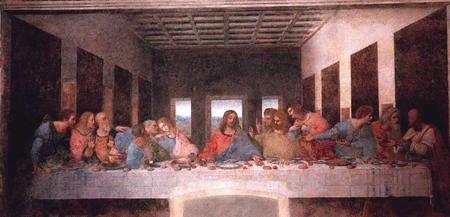| Mary and JC | 2003-11-01 18:11 4 comments |
 by Flemming Funch by Flemming FunchABC TV plans a documentary looking into the possibility that Jesus had a wife. Should hardly be a news item, but apparently that is something that causes controversy. The show is based on The Da Vinci Code, a novel I haven't read, but which is based on lots of research found in other places. Like, I've read Holy Blood, Holy Grail. Which in part presents an excellent case for the story that Jesus and Mary Magdalene had descendants and that there's a lot of intrigue around secret groups of people carrying on and protecting their blood line. Anyway, as to the Da Vinci thing, look at the famous "Last Supper" picture. As Michael Rivero says: "That's a woman sitting next to Jesus, occupying the traditional position of a wife. Under Judaic laws of the time, Jesus could not be a Rabbi unless he were married. But Jesus marriage and his children are the secret Christianity does not want you to know, because the early Christian church leadership was based on the concept of apostolic descent, which only works if Jesus died without heirs. In the 1200s, the Catholic church, in order to consolidate power, undertook to erase from the world the descendants of the historical Jesus, and all public record that they had ever existed. In the process, 1/2 the population of Southern France was murdered."I don't know if it was exactly half, but it was pretty bad. And there we're talking here about the Albigensian Crusade in which the catholic church wiped out the Cathars and carried out a general genocide. "Kill them all, God will recognize His own." Anyway, a number of the trails of Jesus and Mary Magdalene seem to lead here, Southern France, the Languedoc area. And the Cathars happened to have their very own idea of what to believe in. Dan Sewell Ward says: "What did the people of the Languedoc do to deserve such a crusade? The Languedoc practiced a civilized, easy-going religious tolerance, much like Byzantium. In contrast to the fanatical zeal that characterized other parts of Europe, the Languedoc was a place where learning and philosophy flourished, poetry and courtly love were extolled, and Greek, Arabic and Hebrew were enthusiastically studied. Schools devoted to the Kaballah -- aka, Ha Qabala, the ancient exoteric tradition of Judaism -- thrived.Sounds much preferable to me. No wonder they were massacred. But they aren't exactly gone. The spirit of the Cathars is quite alive today with the people who live here. It is an important memory and historical background for who people are, and just about everybody who's lived here for a while is ready to tell you the story, and you see books and magazines and TV shows everywhere about the Cathar heritage. And, I must admit, I find it rather intriguing myself. |